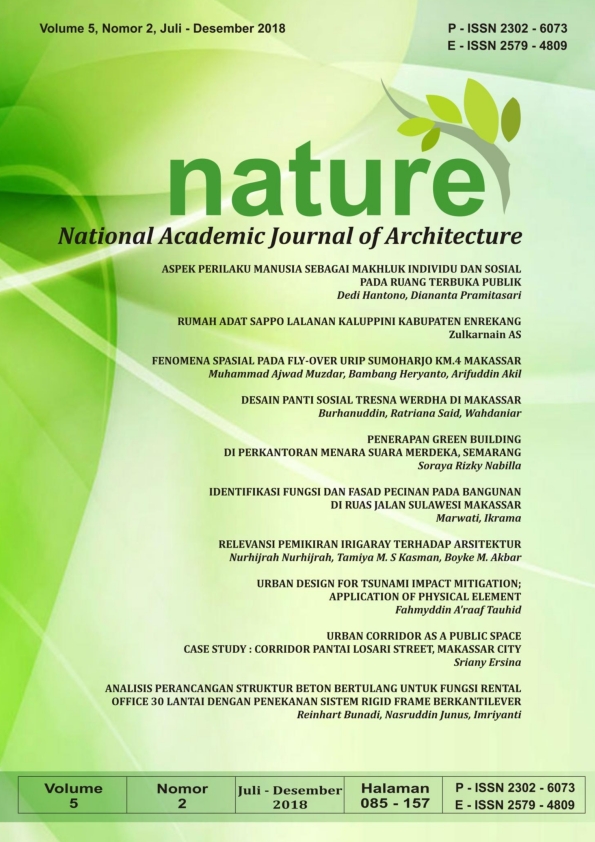RELEVANSI PEMIKIRAN IRIGARAY TERHADAP ARSITEKTUR
Abstract
Abstrak_ Teori arsitektur terlahir dari beberapa pemikiran filosof yang membahas tentang hubungan manusia dengan ruang. Pemikiran para filosof tersebut, menjelaskan bagaimana memahami manusia sebagai pengguna produk arsitektur. Berbagai pemikiran tersebut kemudian diterjemahkan oleh para praktisi dan mahasiswa arsitektur ke dalam konsep perancangan yang lebih humanis. Tulisan ini bertujuan mendiskripsikan pemikiran salah satu filosof yang berkontribusi pada perkembangan teori arsitektur, yaitu Luce Irigaray. Pemikiran Irigaray mengenai feminisme akan dijelaskan bagaimana relevansinya terhadap konsep desain arsitektur. Tulisan ini disusun dengan metode kajian literatur dengan mengkaji dua pemikiran Irigaray yaitu mengenai konsep fluiditas dan persepsi melalui sentuhan. Adapun hasil kajian dari kedua konsep hasil pemikiran Irigaray, yaitu fluiditas dan persepsi melalui sentuhan, keduanya menjelaskan bagaimana perbedaan gender dalam suatu ruang menentukan bentukan dari suatu produk arsitektur. Apabila arsitek telah dapat mewadahi perbedaan kebutuhan antar gender, maka karya tersebut telah mengakui kedua gender sebagai subyek yang diwadahi dalam suatu produk arsitektural, bukanlah lagi sebagai objek. Sehingga tercipta suatu karya arsitektur yang lebih humanis.
Kata kunci: Irigaray; Feminisme; Teori Arsitektur.
Abstract_ Architectural theory was born from several philosophical thoughts which discussed the relationship between humans and space. The thought of the philosophers explained how to understand humans as users of architectural products. These various thoughts were then translated by architectural practitioners and students into more humanistic design concepts. This paper aims to describe the thoughts of one of the philosophers who contributed to the development of architectural theory, Luce Irigaray. Irigaray thinking about feminism will explain how relevant it is to architectural design concepts. This paper is compiled with a literature review method by examining two irrational thoughts, the concept of fluidity and perception through touch. The results of the study of the two concepts of Irigaray's thinking, fluidity and perception through touch, both explain how gender differences in a space determine the formation of an architectural product. If the architect has been able to accommodate differences in needs between genders, then the work has recognized the two genders as subjects that are contained in an architectural product, no longer as objects. Thus creating a more humanistic architectural work.
Keywords: Irigaray; Feminism; Architecture Theory.
Downloads
References
Antariksa. 2001. Politik Ruang. Newsletter Kunci, Edisi 9, Jogjakarta.
Canters, H., & Jantzen, G. M. 2005. Forever Fluid: A Reading of Luce Irigaray's Elemental Passions. Manchester: Manchester University Press
Grosz, Elizabeth. 1993. Merleau-ponty and Irigaray in the flesh. Thesys MIT
Leberman, Alyson. 2012. Accessing Women through Masculine Discourse: Luce Irigaray’s Embodied Syntax. Philosophy Senior Thesis of Haverford College
Natalia, Stephanie. W. 2009. Keterangan Perempuan di dalam Subjektivitas Maskulin: Sebuah Analisa Kritis atas Tatanan Simbolis Jacques Laca. Skripsi Universitas Indonesia Depok.
Patterson, Mark. 2007. The Sense of Touch: Haptics, Affects and Technology. Berg. London
Prabasmoro, Aquarini P. 2005. Feminisme sebagai Tubuh, Pemikiran, dan Pengalaman. Studi Kebudayaan, FSRD ITB.
Rawes, Peg. 2007. Irigaray for Architects. Routlede Taylor and Francis Group, London and New York.
Stone, Alison. 2006. Luce Irigaray and the Philosophy of Sexual Difference. Cambridge: Cambridge University Press
Tong, Rosemary. 1989. Feminist Thought: A Comprehensive Introduction. London: Unwin Hyman
Wismantara, Pudji.P. 2009. Politik Ruang Gender pada Permukiman Taneyan Lanhang Sumenep. Jurnal Kesetaraan dan Keadilan Gender, Pusat Studi Gender (PSG) Universitas Islam Negeri Maulana Malik Ibrahim, Malang
Copyright (c) 2019 Nurhijrah Nurhijrah, Tamiya M. S Kasman, Boyke M. Akbar

This work is licensed under a Creative Commons Attribution-ShareAlike 4.0 International License.
By submitting your manuscript to our journal, you are following Copyright and License











